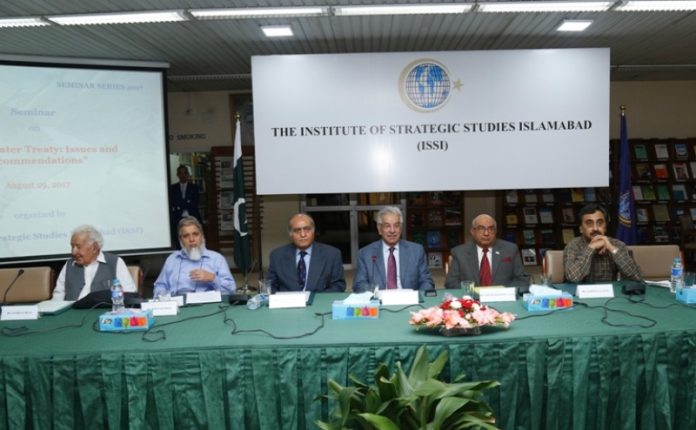Press Release
Seminar
on
“Indus Water Treaty: Issues and Recommendations”
Institute of Strategic Studies Islamabad
August 29, 2017
“With the advent of the 21st century, rapid economic expansion and technological innovation has led to intensive struggle between nations for natural resources, of which water is the most important. Water security is the most serious concern and is emerging as the key national security issue. The tensions over access to water, within and between countries in the region are growing and are increasingly securitized. The issue seems even more complicated when regional and bilateral rivalries are taken into account. Additionally, the changing patterns of precipitation, as a result of climate change exacerbate the scale of challenges before us.” This was stated by Mr. Khawaja Muhammad Asif, Foreign Minister of Pakistan, during his address as Chief Guest at a Seminar on “Indus Water Treaty (IWT): Issues and Recommendations”, organised by the Institute of Strategic Studies Islamabad (ISSI) today.
Other distinguished speakers at the seminar included; Mr. Sardar Muhammad Tariq, CEO and Chairman Pakistan Water Partnership (PWP); Mr. Ahmer Bilal Soofi, President Research Society of International Law (RSIL); Mr. Muhammad Shams-ul-Mulk, Former Chairman WAPDA and Mr. Mirza Asif Baig, Commissioner at the Pakistan Commissioner for Indus Water (PCIW).
Mr. Khawaja Asif stated that since its inception in 1960, the IWT has withstood the test of major disputes between Pakistan and India. However, New Delhi is not fulfilling its part of the IWT and has endeavoured to circumvent the dispute resolution mechanism, particularly concerning the design parameters of its Kishenganga and Ratle hydro-electric plants, as well as provisions of general applicability for all future run-of-the-river hydroelectric projects on the Western rivers. He said that New Delhi is not fulfilling its share of responsibilities under the Indus Water Treaty. Mr. Asif went on to say that Pakistan hopes that with regard to the present dispute on Kishenganga and Ratle hydro-electric plants of India, the World Bank will fulfil its commitments with regards to the treaty, and play its due constructive role to help resolve the water issues between Pakistan and India, which will pave the path to ensure the peace in the region.
Earlier, Ambassador Khalid Mahmood, Chairman ISSI, in his welcome remarks stated that the need for water dispute settlement is accentuated by the fact that both India and Pakistan are mainly agrarian countries. Added to this is the fact that the water question is not only a functional problem, but one with political aspects linked to the Kashmir dispute. He stated that all outstanding issues can be resolved through proper utilisation of this treaty. As of now, proper legal mechanisms and framework are not in place and the treaty does not encompass factors such as environment or security threats. Hence, mutual efforts should be made to consider and utilise all facets concerning the treaty.
Mr. Sardar Muhammad Tariq gave an overview of the Indus Water Treaty and walked the audience through the negotiation process and the various proposals presented over time. Referring to the treaty’s dispute settlement mechanism he stated that the treaty has both permissive and restrictive clauses which India is violating by overstepping. He said that the disputes are divided into two categories; based on either their technicality or the gravity of the issue.
Mr. Ahmer Bilal Soofi spoke about contemporary legal discourse on the treaty. He stated that even though there is an argument in Pakistan that there is no need for this treaty, he believed that the treaty in its present form should continue. He stated that the treaty is a technical treaty. Two issues which are beyond the text of the treaty are: environment and climate change and outer limit to the number of ‘pondages’ India can make as an upper riparian of the Indus river system. He stated that the IWT needs to be interpreted keeping in view the international law.
Mr. Muhammad Shams-ul-Mulk gave the Pakistani perspective on the Indian construction on western rivers. He started with the history of how the treaty came about and stated that post-partition, even before the treaty was signed, the water problem and questions about its division had begun. He specially highlighted that if one does not use one’s rights, a vacuum is created which is used by the other party to its advantage. He lamented the fact that the rights, provisions and obligations provided in the treaty have been misused and Pakistan is lagging behind to properly use its rights which the treaty has provided it with.
Mr. Mirza Asif Baig gave recommendations and suggestions for enhancing the effectiveness of the IWT. He highlighted India’s and Pakistan’s entitlements under the treaty for both the Eastern and Western rivers. He also spoke about India’s attitude towards the treaty’s implementation and said that for India there are two options: either to agree to Pakistan’s alternative designs or accept the resolution through the Court of Arbitration. He said Pakistan should use water resources on the western rivers in an efficient manner. Pakistan should be determined to get its rights protected, and properly utilize them to its advantage. Tenacity and perseverance with the principled positions would ultimately yield results.
Ambassador Khalid in his concluding remarks reiterated that there was an urgent need for the settlement of this dispute. He said that a proper legislative and regulatory framework is required to protect water resources.













